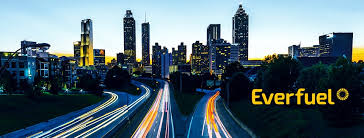Everfuel signs EUR 20.7 million EIB-loan for green transport in Denmark

HERNING: Everfuel A/S has signed a Euro 20.7 million loan agreement with The European Investment Bank (EIB), to scale up and commercialize hydrogen production for use as an alternative fuel for public and heavy-duty fuel cell vehicles.
The financing is supported under the Future Mobility product, backed by the Connecting Europe Facility (CEF) and the NER300 Programme of the European Commission.
Everfuel will use the offtake of hydrogen from existing chemical plants to power public transport in Denmark and aims to build its own electrolyser in Fredericia in the next two years. Under this plan, it will put in place a distribution network, as well as refuelling and ancillary infrastructure in Denmark, to supply the gaseous hydrogen to fuel public transport buses and trucks.
By taking this first step in the hydrogen value chain, it is expected that the cost of using hydrogen as a fuel will come down, making it more economically attractive for operators to switch from fossil to green fuel.
Anders Bertelsen, CFO of Everfuel, said: “Partnerships with strong European institutions play a pivotal role in making green hydrogen for zero-emission mobility commercially available, driving electrification of the European transportation sector and creating a sustainable future.
“We are therefore very pleased to have first secured grants from CEF through H2BusEurope and now financing from the EIB, which enable us to ensure hydrogen production and distribution and establish stations in Denmark to fuel buses and other heavy-duty vehicles.”
EIB Vice-President Christian Kettel Thomsen stated: “The use of hydrogen can be crucial if we want to reach our collective climate goals. The EIB’s recently approved “Climate Bank Roadmap” provides clear indications on what needs to be done to reach net-zero emissions in the European Union by 2050.
“Against that background, green hydrogen has great potential to contribute towards reaching this ambition, not only in the urban transport sector, but more generally as a technically and economically viable technology. Therefore, we’re very glad to support Danish innovative companies like Everfuel which can play an important role in that process.”
Adina Vălean, European Commissioner for Transport, added: “I welcome this loan, which supports the European Commission’s commitment to accelerating the transition to cleaner, alternative fuels for transport. It is fully in line with our Sustainable and Smart Mobility Strategy and the European Green Deal, which set the objective of deploying one million alternative fuel charging points by 2025. We are pleased to support Everfuel on their mission to drive the hydrogen market towards maturity.”
The European Investment Bank (EIB) is the long-term lending institution of the European Union owned by its Member States. It makes long-term finance available for sound investment in order to contribute towards EU policy goals. In 2019, the Bank provided over €850 million in loans for Danish projects in various sectors, including services, innovative industry and small and medium-sized enterprises.
The Connecting Europe Facility (CEF) is an EU funding instrument to promote growth, jobs and competitiveness through targeted infrastructure investment at European level.
The NER300 programme aims at co-financing demonstration projects for environmentally safe carbon capture and storage (CCS) and innovative renewable energy (RES) technologies on a commercial scale. It is funded from the sale of 300 million allowances from the new entrants’ reserve (NER) of the EU ETS (European Union Emissions Trading System). Further NER300 calls for proposals are not planned; however, since 2019 investment operations can be financed under the CEF Debt Instrument with the support of NER300 undisbursed funds.
Future Mobility is a joint initiative from the European Commission and the EIB established under the Connecting Europe Facility (“CEF”) Debt Instrument, which aims to support Europe’s decarbonisation agenda, with an emphasis on cleaner, safer and smarter transport solutions. The Future Mobility facility can be partially funded by the NER300 programme established by the European Union.